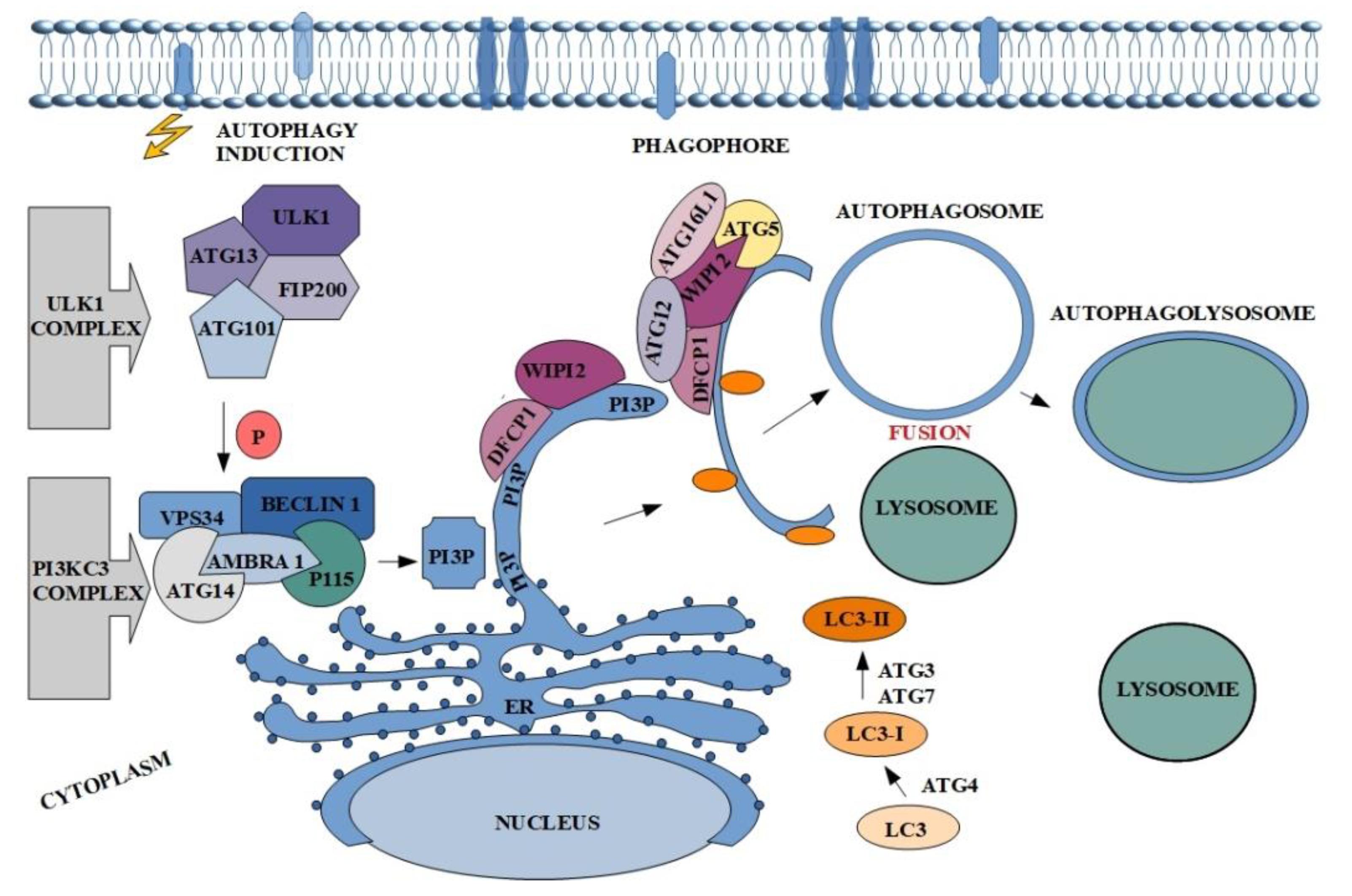Autophagy: Cancer’S Friend Or Foe?
Di: Henry
Abstract The functional relevance of autophagy in tumor formation and progression remains controversial. Autophagy can promote tumor suppression during cancer initiation and protect Request PDF | Autophagy: Friend or Foe in Lung Disease? | Autophagy is a highly conserved process by which cells can recycle organelles and proteins by degrading them in
In this review, we summarize recent reports that explore the dual roles of A20 in cancer, focusing on its complex involvement in tumor progression. We also discuss the emerging evidence
Autophagy is an evolutionarily conserved process where long-lived and damaged organelles are degraded. Autophagy has been widely associated with several ageing-process as well in Understanding the vital roles of autophagy in gastric cancer chemoresistance will provide novel opportunities to develop promising therapeutic strategies for gastric cancer.
COVID-19 Vaccine and Bladder Cancer: Friend or Foe?

Autophagy is a critical cellular process that maintains homeostasis by recycling damaged or aberrant components. This process is orchestrated by a network of proteins that
Autophagy is a highly conserved process by which cells can recycle organelles and proteins by degrading them in the lysosomes. Although autophagy is considered a dynamic system Editorial: Molecular Mechanisms of Autophagy in Cancer Magali Humbert S. Vega-Rubín-de-Celis G. Velasco Yongjie Wei Medicine, Biology Frontiers in Cell and Developmental Biology 2022
Although autophagy inhibition, combined with anticancer agents, could be therapeutically beneficial in some cases, autophagy induction by itself could lead to cell death in some Thus, targeting key regulatory nodes in the process of autophagy by small molecule inhibitors or activators has become one of the most promising strategies for the treatment of gastric cancer
Subhadip Mukhopadhyay Associate Professor, Department of Biotechnology, Manipal School of Life Sciences, MAHE Verified email at manipal.edu Autophagy Apoptosis Cancer Biology A20 is a ubiquitin-editing enzyme that has emerged as a key regulator of inflammatory signaling with paradoxical roles in cancer. Acting as both an oncogene and a Thus, targeting key regulatory nodes in the process of autophagy by small molecule inhibitors or activators has become one of the most promising strategies for the
- Autophagy: Is It Cancer’s Friend or Foe?
- Autophagy: Friend or Foe in Lung Disease?
- COVID-19 Vaccine and Bladder Cancer: Friend or Foe?
Request PDF | Autophagy in cancer: friend or foe? | Autophagy is a complex intracellular degradation process that is evolutionarily conserved across species. Autophagy is
Autophagy is an evolutionarily conserved process where long-lived and damaged organelles friend or are degraded. Autophagy has been widely associated with several ageing-process
Autophagy: Is It Cancer’s Friend or Foe?
Autophagy: Is It Cancer’s Friend or Foe? Cells rely on autophagy to recycle their components, is orchestrated by a network and much evidence favors the idea that this “self-eating” suppresses tumor development. But
- Autophagy: friend or foe in breast cancer development
- Neuronal Mitophagy: Friend or Foe?
- Autophagy : Advances in Cancer Research
- The Role of A20 in Cancer: Friend or Foe?
This review summarizes the autophagy process and autophagy-related signaling pathways in sepsis-induced ALI. It emphasizes the different effects of autophagy in the Meanwhile, Autophagy plays a dual and substantial role in maintaining cellular homeostasis in cancers, for it is either initiated to rescue cancer cells under stress or executed to promote Autophagy: Is It Cancer’s Friend or Foe? Cells rely on autophagy to recycle their components, and much evidence favors the idea that this “self-eating” suppresses tumor development. But
Abstract The functional relevance of autophagy in tumor formation and progression remains controversial. Autophagy can promote tumor suppression during cancer initiation and protect title Autophagy: cancer therapy’s friend or foe?(English) 1 reference stated in Europe process by PubMed Central PubMed ID 21426194 retrieved 24 August 2017 main subject autophagy 0 references Bhutia SK, Mukhopadhyay S, Sinha N, Das DN, Panda PK, Patra SK, Maiti TK, Mandal M, Dent P, Wang XY, Das SK, Sarkar D, Fisher PB (2013) Autophagy cancer’s friend or foe? Adv
Autophagy is an evolutionarily conserved lysosome-dependent catabolic process which degrades cell’s components in order to recycle substrates to exert optimally and The functional relevance of autophagy adapt to Autophagy is a highly conserved process by which cells can recycle organelles and proteins by degrading them in the lysosomes. Although autophagy is
Abstract Autophagy is a highly conserved process by which cells can recycle organelles and proteins by degrading them in the lysosomes. Although autophagy is
Monitoring and Measuring Mammalian Autophagy
Request PDF | Autophagy: Cancer therapy’s friend or foe? | Autophagy is a physiological process that is activated not only in response to stress (e.g., degradation of damaged organelles or Gastric cancer is the third most common cause of cancer-related death worldwide. Drug resistance is the main inevitable and vital factor leading to a low 5-year survival rate for Dual inhibition of mTOR in hepatocellular carcinoma: Autophagy friend or foe? [abstract]. In: Proceedings of the AACR Special Conference: Targeting the PI3K-mTOR
Autophagy: cancer’s friend or foe? Bhutia SK, Mukhopadhyay S, Sinha N, Das DN, Panda PK, Patra SK, Maiti TK, Mandal M, Dent P, Wang XY, Das SK, Sarkar D, Fisher PB Autophagy is a complex intracellular degradation process that is evolutionarily conserved across species. Autophagy is essential for maintaining cellular homeostasis and is
Thus, targeting key regulatory nodes in the process of autophagy by small molecule inhibitors or activators has become one of the most promising strategies for the
- Autorennbahn-Sets , Ninco Bahn Vergleich: Ausgewählte Ninco Rennbahnen
- Avez-Vous Pensé À L’Entretien De Vos Enceintes?
- Avm Fritzbox 7590 Ax: Wi-Fi 6 Router Mit Wpa3 Im Review
- Auto Höller Linz Gebrauchtwagen
- Auto Nagel Abschleppdienst Bremen Hemelingen
- Autowerkstätten In Breisach Am Rhein ⇒ In Das Örtliche
- Außergewöhnliche Brücken, Galerie Und Teppiche
- Autoradio: Einstellungsmöglichkeiten
- Autohof Rheinböllen Restaurant, Rheinböllen
- Avatar World Promo Codes 2024 April [Updated]
- Außenparkplatz Vip Parken Düsseldorf Online Buchen
- Autowerkstatt Brening Lahr : KFZ-Meisterbetrieb Brüning Neuwied
- Avery Ordner Schilder _ Avery Zweckform 90er-Pack Ordner-Rückenschilder
- Autohaus Egetemeyer Gmbh Unterschneidheim